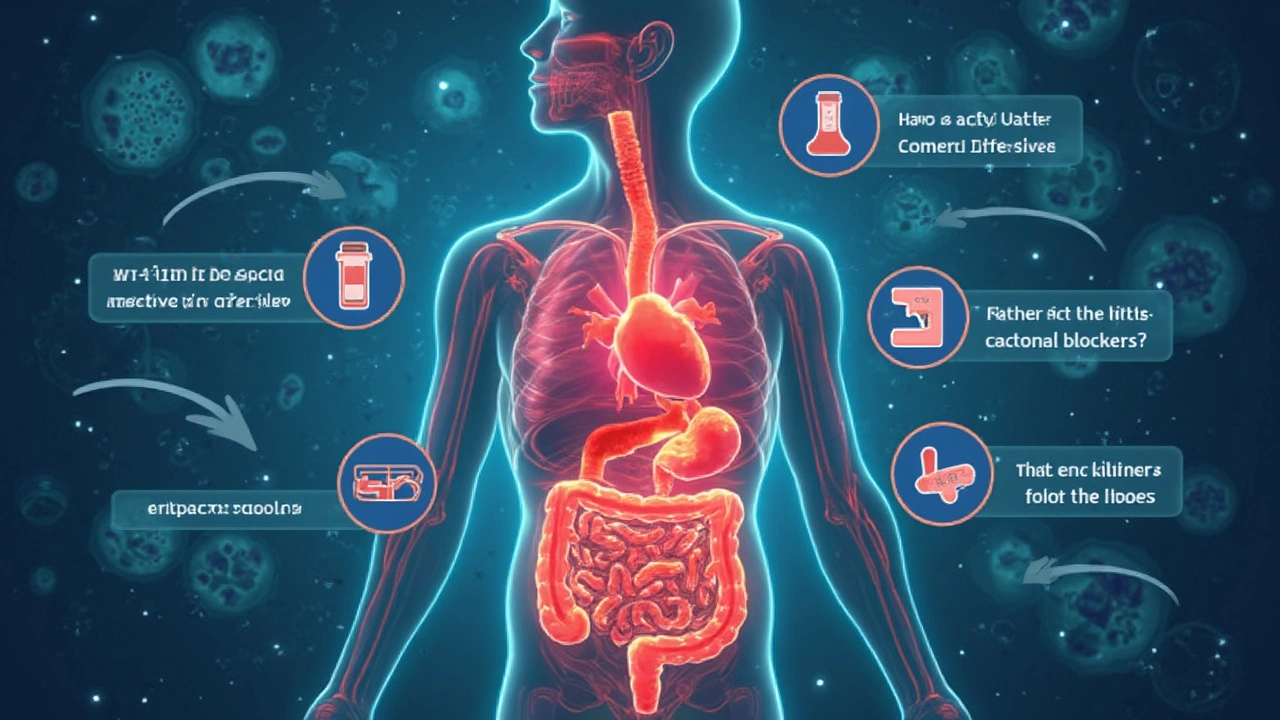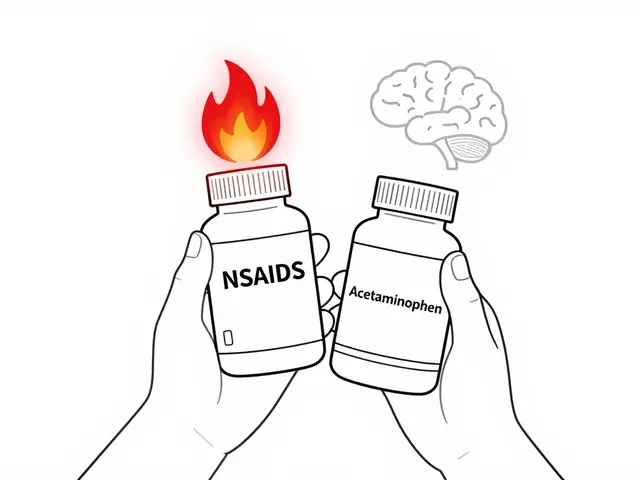What Are Calcium Channel Blockers and Why Are They Prescribed?
Doctors reach for calcium channel blockers when they need to tackle stubborn high blood pressure, chest pain (angina), or certain heart rhythm problems. They sound technical, but the idea is actually straightforward: these meds keep calcium from getting into the cells of your heart and blood vessel walls. What does that do? It relaxes blood vessels, lowers blood pressure, and can smooth out a racing heart. Four main types...yet only a few names get tossed around in most clinics: verapamil, diltiazem, amlodipine, and nifedipine. Each works in its own way, but the end goal is always about easing tension in your circulatory system.
You might be surprised to learn these blockers aren’t only heart drugs. Some doctors use them for migraines, cluster headaches, and even Raynaud’s disease. That's a lot for one class of medication! But here’s the catch: since they slow certain processes inside cells, they can spark a domino effect on things far beyond what you might expect, like how your body handles food, sugar, and fat.
People usually stay on these meds for a while, sometimes years. And when you’re popping a tablet every morning, seemingly minor side effects can add up. If you’ve been told to watch your weight, or you’re starting to notice your waistband feels just a little snugger, you’re not alone. It's not always possible to separate what the medication is doing from a decade-long shift in habits, but the science behind it is worth exploring, especially with so many folks on these drugs. Right now, about one in ten adults over age 50 in the US is on a calcium channel blocker.
Pharmacology textbooks highlight how these blockers help the heart, but when you dig through patient forums or honest discussions with your doctor, it's clear: there are questions about side effects—especially those sneaky ones, like slight weight gain or a sluggish feeling. Nobody likes a mystery when it comes to their health (and their belt loop).
How Calcium Channel Blockers Like Verapamil Interact With Metabolism
The heart, the blood vessels, and fat cells all have something in common: they react to changes in calcium levels. When you swallow a calcium channel blocker like verapamil, it acts quietly—but steadily—on tiny channels inside cell membranes. For heart cells, this means a slower, steadier beat. For the walls of your blood vessels, it’s a gentle relaxation that keeps your blood flowing smoothly. But what does this have to do with metabolism and the number on the scale?
Turns out, calcium is also key in how your body turns sugar and fat into energy. There are little messengers, like hormones, that depend on proper calcium signals. When you block or soften those signals, a lot can shift. Take insulin, for example. It’s the main hormone that shuttles sugar into your cells. One side effect of calcium channel blockers could be they tweak how insulin works. Some studies suggest this lowers your body’s sensitivity to insulin, which means your blood sugar could edge up—especially if you already struggle with diabetes or prediabetes.
But what about the fat part? Animal studies have hinted that blocking calcium entry in fat cells might make them less likely to burn fat for energy. No, it’s not as dramatic as eating a whole cheesecake every night, but over time, slow changes add up. A few reports, mostly anecdotal, describe folks on verapamil noticing a slow, persistent creep in their weight after starting the drug, even with constant diets. That’s not proof, but it’s a pattern doctors notice enough to keep the conversation going.
The effect isn’t the same for everyone. Some folks breeze through months on these meds with zero changes, while others swear nothing else explains their three or four extra pounds. Age, gender, and genetics probably play a part. The upshot: if you’re noticing weight gain after starting verapamil or a cousin drug, talk to your doctor—not everyone’s body reads the playbook the same way.

Linking Verapamil With Weight Gain: Is There Real Science Behind It?
Let’s address the elephant in the room: can verapamil really make someone gain weight, or is this just another side effect rumor that’s gained momentum online? This isn’t a subject just for health blogs and late-night Googling. Actual clinical studies and post-marketing reviews have poked at the question, usually with mixed results. In early trials, side effect rates for weight gain with verapamil were pretty low, but those studies often weren’t focused on tracking every ounce.
When researchers tracked patient records over years, a subtle trend did begin to appear. They noticed that a small percentage—anywhere from 2% to 6%—of patients on verapamil reported gradual weight gain. Usually, we’re talking one to five pounds over a year, not wild swings. Not everyone is affected, but for those who are, it’s a real annoyance, especially if you’re working hard to control your weight due to other health problems.
Why does this happen? The thinking goes back to how blocking calcium can nudge your metabolism and possibly mess with your body’s hunger cues. Some patients swear they feel hungrier on verapamil. Others mention mild fluid retention, which can tip the scale up a bit. If you’re curious about research digging into these changes, check out the deep-dive on verapamil weight gain—it’s a rabbit hole worth exploring if you want the details.
One more twist: calcium channel blockers rarely act alone. Many folks are on several medications at once. Some blood pressure pills, antidepressants, or diabetes meds are much bigger culprits for weight gain. If you’re seeing real changes on the scale, it’s smart to look at your full medication list—not just verapamil.
Appetite, Cravings, and the Subtle Shifts You Might Notice
It’s not just what shows up on the bathroom scale. Some people say calcium channel blockers tweak their appetite in subtle ways. It’s less about sudden ravenous hunger and more about gradual changes—maybe you feel like snacking an extra time after dinner, or dessert starts to look more appealing. The science is murkier here, but some doctors think the way these meds interact with brain receptors plays a quiet role.
Calcium signals are everywhere, including the brain, where appetite is controlled. When you soften those signals, it can slightly dull the fullness cues that usually tell you to put down your fork. You end up eating just a little more often. Will this make or break your weight goals? Not alone, but if you’re already struggling with lifestyle changes, every little nudge adds up.
Some people also report tiredness or a slow-down in their usual energy, making exercise less tempting. If you used to head out for a ten-minute walk after dinner and now you don't, those missing calories burned get noticed by the scale over time.
- Track your hunger and fullness for a week if you’re starting these meds. Sometimes, writing things down makes the pattern obvious.
- If you’re feeling more peckish, aim for snacks that fill you up without going overboard—plain Greek yogurt, a boiled egg, some veggies with hummus.
- Talk to your doctor if you’re seeing a major difference in cravings; adjustments to the medication or time of day you take it can sometimes help.
On the upside, most people notice only a modest change, if any. But if you’re the rare person who feels a real difference, don’t power through alone. Blood pressure control matters, but so does your quality of life.

Smart Tips for Managing Weight While Taking Calcium Channel Blockers
No need to resign yourself to buying bigger clothes. While calcium channel blockers might nudge your weight in the wrong direction, you can stay in control with a few practical moves. Here’s what works in the real world:
- Stay consistent with movement. Aim for just 20-30 minutes of walking most days—this isn’t about running marathons but about keeping your metabolism humming.
- Eat with intention. If you’re hungrier, build extra vegetables and lean protein into meals. They keep you fuller for longer without adding fluff to your calorie count.
- Watch your salt intake. Fluid retention is a sneaky side effect. Cutting back on sodium (think fewer packaged foods, less added salt) keeps water weight from rolling upward.
- Keep a simple diary: jot down your meals and snacks for a couple of weeks after starting a new drug. This helps spot patterns and avoids mindless munching.
- Stay hydrated. Sometimes, the body confuses thirst for hunger—especially on blood pressure medications. A glass of water before meals can make all the difference.
- Check in regularly with your healthcare team. Blood tests can rule out blood sugar bumps or thyroid issues that might be playing a role.
- If things still trend up, talk honestly with your doctor. In some cases, switching to a different blood pressure med can flatten the curve on weight gain.
For those number-crunchers out there, here’s what a recent outpatient clinic report showed:
| Drug | Average Weight Gain Over One Year | Percent of Patients Affected |
|---|---|---|
| Verapamil | +2.2 lbs | 4% |
| Amlodipine | +1.8 lbs | 3% |
| Beta Blockers | +3.5 lbs | 8% |
| Thiazide Diuretics | +0.5 lbs | 1% |
Not dramatic, but it adds up if you’re watching every ounce. The more you know about how these drugs behave, the less likely you are to get blindsided. Staying proactive is your best defense—let your doctor know about any changes and tweak what you can at home. Medications are a tool, not a life sentence. Work with your body, adjust as needed, and keep asking questions. You’ve got this.






Nishigandha Kanurkar
This is all a cover-up! Calcium channel blockers are just the tip of the iceberg-Big Pharma is secretly using them to make us fat so we buy more drugs!!! They know the truth about calcium and the brain’s hunger signals, but they won’t tell you because profits > people!!! Don’t trust your doctor-they’re paid by the labs!!!
Michelle Lyons
I’ve been on verapamil for 3 years and gained 12 pounds. I didn’t change my diet. I didn’t stop walking. My thyroid is fine. Coincidence? Maybe. Or maybe the government’s been injecting fluoride into the water to make the drugs work better… I don’t know anymore.
Cornelle Camberos
The empirical evidence regarding verapamil-induced weight gain remains statistically insignificant in peer-reviewed literature. While anecdotal reports exist, they are confounded by lifestyle variables, dietary noncompliance, and the natural progression of age-related metabolic decline. To attribute causality without controlled longitudinal studies is scientifically unsound.
joe balak
I started verapamil last year and gained 3 lbs. Didn’t think much of it until I saw the table in the post. Now I’m wondering if it’s the drug or just me getting older. Either way, I’m walking more.
Iván Maceda
America is falling apart because we let foreign drug companies control our medicine. 🇺🇸 They make these pills to keep us docile and overweight so we don’t protest. I switched to garlic and yoga. My BP is better. My waistline? Still fighting. 🇺🇸
Vrinda Bali
It is not merely a pharmacological phenomenon-it is a societal unraveling. We have surrendered our bodies to chemical manipulation, and now we are told to blame our own willpower. This is not science. This is servitude. Verapamil is not the villain-it is the symptom.
John Rendek
Good post. The tips are practical. If you’re gaining weight on these meds, don’t panic. Track your food, move daily, talk to your doctor. It’s not the end of the world. Many people manage it fine with small changes. You’re not alone.
Sonia Festa
So I’m on amlodipine and I swear I’ve been snacking like a raccoon in a dumpster. Not because I’m hungry-because my brain’s like ‘hey, why not eat this entire bag of chips? It’s fine.’ My pants are crying. My therapist is confused. The drug? Probably. But also… maybe I’m just lazy. 🤷♀️
Sara Allen
i think its the water retention thing. i mean like i drink more water now because my doc told me to but then i just swell up like a balloon and the scale goes up and i cry. why do they even make these drugs if they just make you fat? i hate it. i just want to be normal again
Amina Kmiha
The FDA knew. They ALWAYS knew. They approved verapamil with hidden metabolic side effects because the pharmaceutical lobby paid off every regulator since 1987. And now you’re paying-with your waistline. 😔📉 #BigPharmaLies #VerapamilIsAScam
Jessica Adelle
It is morally indefensible to prescribe a medication that induces weight gain without explicit, documented informed consent. The patient’s autonomy is being systematically violated under the guise of therapeutic necessity. This is not medicine. This is institutional negligence.
Emily Barfield
If calcium is the key that unlocks cellular metabolism… and we block it… then what are we really doing to the soul of the body? Is weight gain just a side effect-or is it the body screaming that something deeper has been tampered with? Are we treating hypertension… or are we silencing the body’s natural intelligence?
Sai Ahmed
I’ve been on these drugs for 5 years. No weight gain. My neighbor gained 15 lbs. Same meds. Different genetics. Stop blaming the pill. Blame your genes. Or your laziness. Or both.
Albert Schueller
The data is clear: verapamil has a 4% incidence of weight gain. That’s lower than the rate of people gaining weight from aging alone. To attribute every pound to the drug is irrational. Check your diet. Check your sleep. Check your stress. Then blame the pill-if you still must.